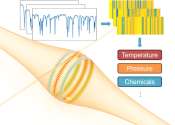Suzaku 'post-mortem' yields insight into Kepler's supernova
(Phys.org) —An exploding star observed in 1604 by the German astronomer Johannes Kepler held a greater fraction of heavy elements than the sun, according to an analysis of X-ray observations from the Japan-led Suzaku satellite. ...









